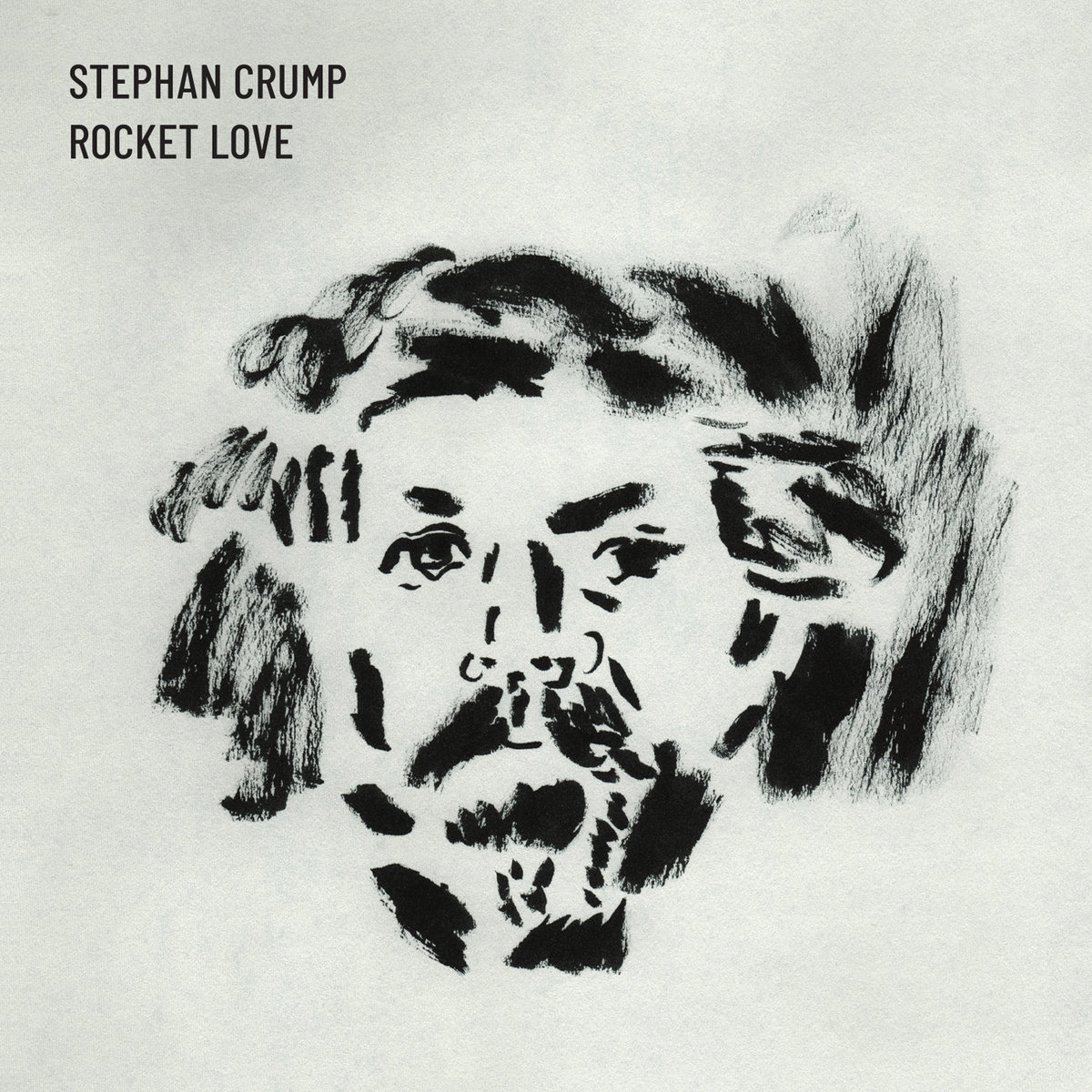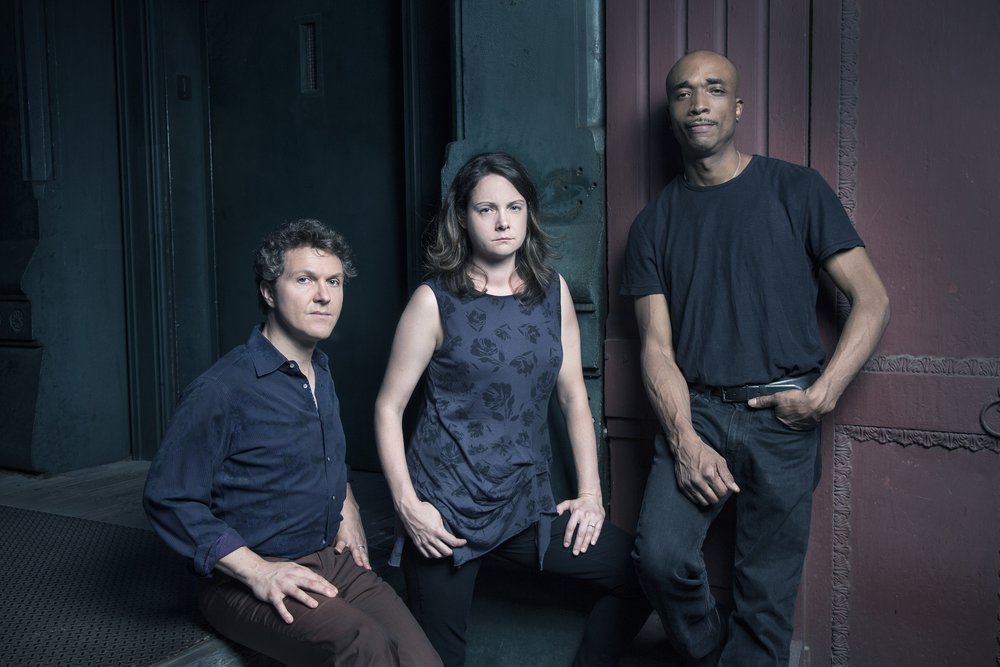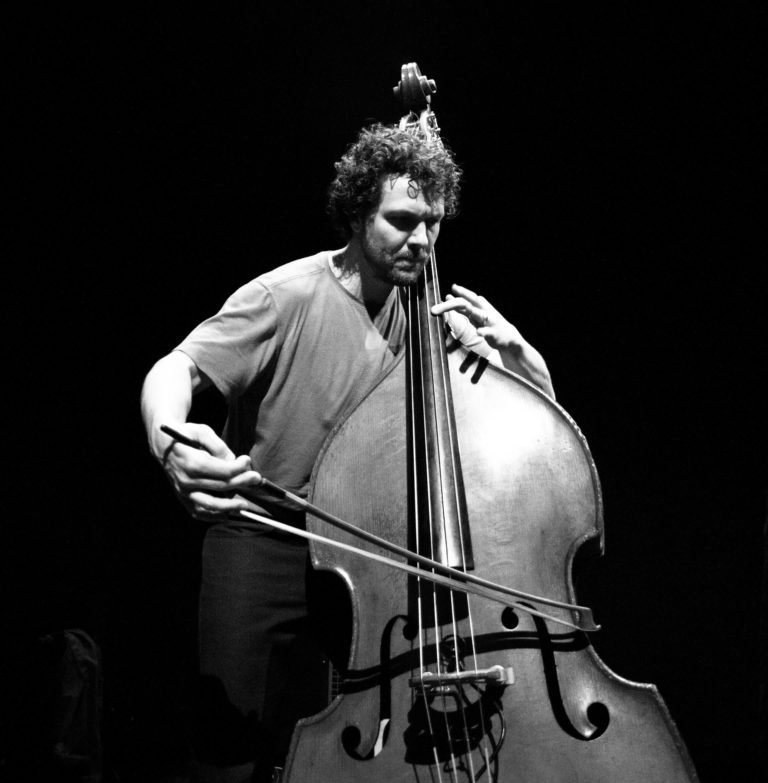There’s a lot of laughter when Stephan Crump and I catch up on the phone, partly because long ago we played together in Big Ass Truck. Even then, both of us set our sights beyond Memphis. “For me, at that point, I knew that I had to be a musician, and I knew that I was going to finish school and move to New York,” he says of those days. His reason for making a hometown stop now has less to do with our old combo than what he found when he moved on to Gotham. For New York is where he’s truly carved out his own niche in the free jazz/improvisational music scene, and where he’s lived, composed, taught, and performed for nearly thirty years.
On Saturday, he’ll leave a little of what he’s learned along the way in The Green Room at Crosstown Arts. And, as he confesses, the possibility of old friends and family distracting him is daunting. “It’s quite rare that I play Memphis. And it’s pretty intense, because there are just so many more dynamics at play for me personally. I could talk about going straight into and through the fear! I’m just recognizing that there’s all this stuff, that’s all wonderful and a blessing, but is a lot to deal with. It’s more distracting.”
Lest anyone get the wrong idea, diving straight into and through the fear is part of the do-or-die attitude that Crump and many other players embrace while improvising in the most unstructured settings. But while he’s often pegged with the free jazz/improv tag, Crump actually plays in a variety of ways across many projects, as he explains below.
Saturday’s show will focus mainly on his latest album, a selection of works for solo bass dubbed Rocket Love, and, as revealed below, Crump is relishing the chance to bring all the sonic possibilities of the instrument to the fore on his current six-city tour.

Memphis Flyer: In your description of making the new record on Bandcamp, you say making it sustained you through the first year of the pandemic, “materially and spiritually.” It sounds like that was a real life-saver.
Stephan Crump: It was, man. There were so many blessings in that period. We have two boys who are now 17 and 13. My wife’s a high school history teacher, so she was teaching all day on Zoom, and I was helping the boys manage online school. I started teaching music online, but having the album project was absolutely a lifeline as far as creativity. Having my Bandcamp fans support an aspect of it made it feel like a community was behind it. A modest community, but it still felt good. So that was great. Also, I had a home studio, and I could have just planned a record and made it and been done with it, but, as I usually do with albums, whether it’s at home or another studio, I wanted to do a different process with this and really take my time and build that community, and not feel like it needed to be a certain number of pieces. It could just be open-ended. I could experiment. It was a really good mode.
How exactly were you interacting with your supporters?
It was through Bandcamp. They have a subscription-based thing that you can do. I wrote my subscribers updates and they would get two pieces a month: one cover or a standard, and an original piece. Then I also did a series of Facebook live concerts from my studio. Not only would I broadcast those to supporters and fans, from all parts of the world, I had all my microphones set up and I was recording it properly in my studio. So some pieces on Rocket Love were just me doing them in my studio in various moments, but some were recorded during those concerts. And that brought a different energy. Facebook Live is not like being in the same space with people, of course, but it’s still a performance and still creates a good kind of tension and energy to engage with. You do have to step up to a certain mode of performance that galvanizes your focus and energy. People would write comments, and I’d stop between tunes to respond. It felt good to me. I needed that.
Musically, it’s just you playing solo, right?
All of the pieces are just me on bass, except for one cool thing which was an experiment that worked out. The record is book-ended by this two-part piece called “Lament.” Those two pieces happened on the last two days of 2020. I wanted to try something different, so I said, “Let me do a piece channeling all my feelings about this year, all the complexities of it. And do a short piece where, instead of just one bass I’ll do three, with overdubs.” But on the first track, which I did on December 30th, I said, “Let me play one of the voices and then immediately play the second one and immediately play the third one, but without listening to any of it, with no headphones.” So I wasn’t listening to what I had played previously.
The next day, I did the same thing, but I listened as I overdubbed. And that’s “Lament, Part II.” I could hear what I played before. But on “Lament, Part I,’ I wasn’t. I love both pieces, but there’s something that is transcendent about the first one. It was such a learning experience because I realized I was playing along with what I had played before, because I was in the same zone, and I had just done it. Emotionally and spiritually, I was playing along with it. But the part of my brain that gets engaged when I’m listening and playing along, and interacting with something, was not a factor. So it remained on a less cerebral plane. It remained on a more spiritual plane.
I feel like it’s just a reminder to me that that’s where the real shit is anyway. That’s what we’re trying to get to when we are listening and interacting. That experimental way of doing it was just a more direct thing. Technically, if you were to analyze it harmonically and melodically, obviously there are things that never would have happened had I been listening and playing. But there’s something that gets communicated that’s so right, that whatever details on the surface that would be deemed to be dissonant or wrong or whatever, are totally irrelevant. That’s just surface information.
The stuff that we think music is about — notes and tones and chords and melodies and harmonic relationships — all of that is just the surface, the crust, of what it is. The real stuff that you need to make any of that worthwhile is living underneath.

Free jazz or improv is your stock in trade, isn’t it?
Yeah, like my project called the Borderlands Trio. We have two albums, and the latest one is a double CD called Wandersphere. It’s a piano trio, all spontaneously composed. It’s always evolving and always grooving. Playing that way is also a big thing that I teach. I love bringing people into that zone and clarifying for them how to be in that mode.
I also compose. I write pieces for my band, and for improvising ensembles. And that’s a whole other thing. How do you create an environment with a distinctive, powerful DNA that maintains its identity while also inviting people in to express themselves, and be as expansive as possible within that?
You write that you had planned the album even before the pandemic hit.
I had been thinking about it the year before, then in January I put the plan together, and February was when I did the initial outreach. I announced the process and planned to start in March. And then…[laughs].
I completed the year. I did it from March to March, which was my original plan. I completed it and had two albums worth of material, but this plan was never about being constrained by good album length. It was about using another forum to see what that brings, and not think about an album until afterwards. So I finished in March, but only later that spring or summer did I decide to curate an album from that whole body of work. And that’s what Rocket Love is.
The bass has so many sonic possibilities, yet it’s rare to be able to focus on that instrument alone.
When you’re talking about the acoustic bass, there’s so much to the sound of it that doesn’t speak through a traditional ensemble. There’s a lot of it you can’t explore and get to as a player, when you’re exclusively playing in those contexts. So it’s something I’ve been exploring in some of my other, less traditional ensembles, to try to make space for some of the expressiveness of the bass. Playing solo is an extreme version of that. You get to decide what your sculpture is, what you present to the audience. You can decide, this piece is going to be about texture, about sound. The next piece might be about melody, or groove. You can make those decisions, and by limiting yourself to the one instrument, you’re also expanding the palette of what’s viable as a piece of art.
Stephan Crump plays The Green Room at Crosstown Arts on Saturday, October 15, 7:30 p.m. Tickets: $20 advance/$10 student | $25 day of the show.
